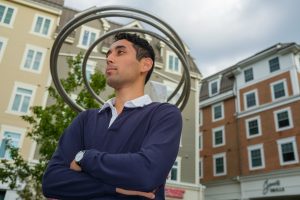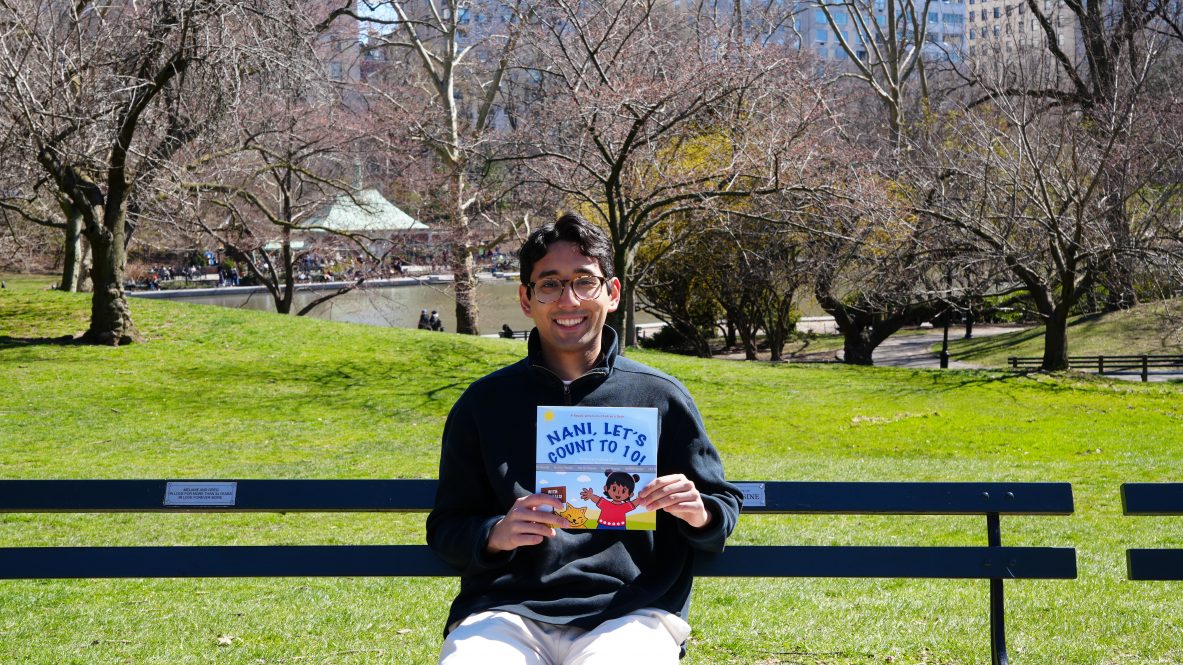Every month, Prabhas KC ’22 (CLAS) gets messages from current UConn undergrads and prospective UConn students.
They find him through his LinkedIn page, or send a note to his UConn email address.
The amount of messages isn’t overwhelming, just two or three a month – a couple dozen a year since he completed his own undergraduate studies in economics at UConn. Some are regulars that he hears from again and again, from time to time. Others he’s never met before.
No matter who the message is from, KC always responds.
“I try to speak to all of them,” he says, “because I know how much of a difference it made for me when alumni would like be like, ‘Yeah, of course I’ll talk to you.’
“And regardless of title and age, they were always willing to.”
A Personal Board of Advisors
In his own senior year at UConn, KC knew that he wanted to pursue a strategy career in the technology industry, but what he didn’t know was where to start.
“It’s such a high, fast-growth industry,” he says. “’Growth’ is my favorite word, and I knew that’s where I wanted to be, but I didn’t really have the full background or connections to that industry.”
In that fall semester, KC set a goal for himself to reach out to one UConn alum every single day. He’d hop on LinkedIn himself and search through the more than 100,000 UConn alumni connected to the University’s official account for people who worked in a variety of roles in and around the technology industry, or for alums who just seem to have interesting job titles – and then he’d message them.
“By the end of the week, it would be seven that I’d reach out to, at a minimum,” he says. “Luckily, as a UConn student, if you reach out to UConn alums, the success rate is pretty high that they’ll at least respond. Even if one or two didn’t, I’d have five that would be happy to chat, and then maybe three or four of those would actually become a half-hour virtual call.”
He used those calls to learn their personal stories, to ask them how they’d gotten to their current jobs. He spoke to strategists and entrepreneurs. To an alum who started off as a teacher and then completely pivoted into a career in business. To people who thought they were going to do one thing and kept with it, and others who found that something else was their real true passion once they left college and started on a career path.

As he collected perspectives and advice, he also built a network of people with diverse experiences and backgrounds. Many became mentors who not only helped guide him through his senior year, but also beyond that, as he entered the workforce.
And finding a network of mentors is actually the first piece of advice that KC offers to current UConn students when they reach out to him.
“Build out your personal board of advisors – the people who you can reach out to for trusted advice,” he says. “Whenever I have to face a life decision, I know I can reach out to these people at any time. That’s probably been one of the most impactful things that I started at UConn, and it’s paid dividends that I could never have thought about.”
Explore Everything
The second piece of advice he offers is for UConn students to explore everything they’re interested in while at UConn – and not just those interests that fall within particular majors.
“I have a lot of students in the Business School who ask, ‘What are the business clubs that I need to be in?’ and I can answer that question, for the most part,” KC says. “But I always tell them, go explore something else that’s not in the Business School. Not everything has to be included on your résumé.”
UConn has more than 700 clubs and student organizations, many of which are featured at the University’s Involvement Fair.
“I remember walking around the Involvement Fair as a student, and anything that I was interested in, I would first go talk to the person that’s working at the booth, just to see what got them interested in it, what the club does,” he says. “And then, I would just sign up for as many as I could in that time that it was there.”
Often, KC would sign up for more clubs than he could manage. But he’d go to them, see what they were all about, and then he’d stick with the ones that he found the most interesting. He joined the business clubs, but he also joined photography clubs and nonprofits and the Pan Asian Council, just because they interested him. He took a poetry class.
“Underneath each of those clubs, a part of all those clubs, are people who are super passionate about that topic,” he explains, “and I can’t really find many places that replicate that kind of structure, where if I’m interested in photography, there’s 15 different photography clubs on campus. I can go meet the kids that love photography, or even the faculty that love photography, and you create such good friendships. You get to learn from other people’s perspectives.”
Get After It
The last piece of advice KC offers to students is to create short-term goals – with a long-term direction in mind – and really get after them.
“Once you’ve explored and you’ve identified some things that you’re really passionate about, go after those short-term goals very aggressively,” he says.
In his senior year, that meant emailing seven alumni a week to learn all he could about breaking into the tech industry – that was one of his short-term goals for that fall semester.
But another goal for his senior year was to be the student speaker at his Commencement ceremony – he’d been the student speaker at his graduation from E.O. Smith High School in Mansfield.
“I knew, in four years, no matter what, I’m going to do the same thing at UConn,” he says. “At that point, I didn’t have a major selected. I didn’t know any of the details. I didn’t know how. But I just knew I was going to make it happen.”
After graduating high school, KC struggled in his first semester at UConn. He found himself lost – he was close to failing some of his classes. He was overwhelmed. He didn’t feel like he belonged, and as he thought about dropping out, he wondered if it might be history repeating – both his father and his brother had attempted programs of study at UConn, only to withdraw before completion.
He felt like the family had a curse when it came to UConn, and that curse had come for him next.
But instead of accepting that fate, he instead started building his network. He set goals. He sought out academic, mental health, and peer resources on campus. He began to turn his academics around, and he used his exploration of interests to start building a social circle that left him feeling far less isolated.
He shared his story publicly with the University community in the hopes that others who might also be struggling could feel less alone. The outpouring was immediate.
“People resonated with it,” he said, “and it made me feel like I wasn’t just telling my individual story, but the story of students that were struggling.”
When he graduated from UConn in 2022, he was the student speaker at his ceremony.
“I didn’t realize that curse was broken until that night after graduation, after giving that speech,” he says. “I was so focused on this dream of giving that speech, and that came true, that I forgot that, at one point, it wasn’t even the speech that felt like a shot in the dark. Graduating felt so far away, just not attainable.
“But I found people who believed in me, who supported me, who invested in my growth. I took advantage of the resources we have at UConn. I figured out the direction I want to head into – and I also would take a deep breath from every now and then to just fully take it in. As a result of all those things, I graduated, I gave that speech, and that curse was finally broken.”
Still Growing
Now two years out of college, KC is living in Brooklyn with two of his good friends from his days at UConn and working for ServiceNow – a California-based technology company that partners with businesses worldwide to design and launch digital products – where he spends most of his time managing product launch strategy with ServiceNow’s Partner companies.
“It’s a lot of strategic planning, seeing what the steps are that we need to take to get this to be successful, and how we tailor things to whoever we’re working with,” he says. “One of my roles there is advising and consulting, which I learned a lot of in the UConn Consulting Group, so it’s a continuation of some of the stuff I was doing when I was 20 or 21.”
The rest of his time at ServiceNow is spent working on operational excellence initiatives with a more-experienced colleague – something KC didn’t do much of in college. Because “growth” is still his favorite word.
“Everything that I do at ServiceNow, it’s about how do I grow my practice, how do I grow our operations process, and ultimately how am I growing myself in this role in this company?” he says.
He hasn’t stopped exploring, either. He partnered with another UConn classmate, Nick Guimaraes ’22 (CLAS), who he met by chance at the end of his senior year, on a completely different project – a children’s book – which the pair independently published in April.
“One night in the last week of college, Nick was telling me about his illustrations, because he knew I loved photography and the arts and everything,” says KC, “and he showed me his illustrations. I just kept it in the back of my mind.”
Inspired by a conversation with his father, the book is aimed at Nepali-American children who are reading with their parents or just beginning to read themselves and is written in both Nepali and English.
“My parents grew up and emigrated from Nepal,” KC says. “Growing up, I had to learn the balance between growing up in America, but also having Nepali parents and being the first in my family to really, truly be Nepali-hyphen-American. It wasn’t until I got older that I realized just how cool it is to have family of the Nepali background, family that’s still in Nepal, and just the two different cultures that I was taking in, and I realized that it was really a privilege.”
He worked on the book for almost a year – a passion project that feels like a continuation of everything he learned about himself at UConn and everything he continues to learn now that he’s graduated, but hasn’t actually left, the UConn community.
“When I was a student, I used to read all of the articles that were written about my fellow students, because I felt like they could give such a relatable perspective,” KC says. “So, I’m hoping that I might help other students realize that there’s so many resources, so many clubs – here’s someone that’s a little bit older, and look, we had similar challenges. I’ll take this advice and go with it – as soon as today.”



